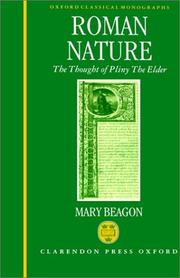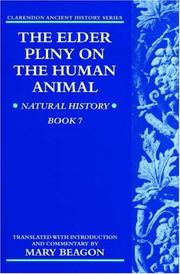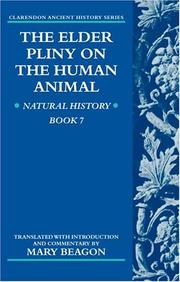| Listing 1 - 6 of 6 |
Sort by
|

ISBN: 0198147260 9780198147268 Year: 1992 Volume: *4 Publisher: Oxford: Clarendon,
Abstract | Keywords | Export | Availability | Bookmark
 Loading...
Loading...Choose an application
- Reference Manager
- EndNote
- RefWorks (Direct export to RefWorks)
"Pliny's Natural History has too often been regarded as simply a quarry for quaint stories--a view which has tended to overshadow its overall structure and purpose. In this book, Dr. Beagon redresses the balance and illuminates the Natural History as the work of an author with an identifiable mode of thinking and a coherent attitude towards his clearly-stated theme, Nature. Taking its cue from Pliny, the book examines his cosmology and in particular his portrayal of the relationship between nature and the creation he considered her greatest, Man. Author and work are also placed in their wider literary and historical context. Pliny himself emerges no longer as a faceless compiler but as a character with a valuable contribution to make to an understanding of intellectual attitudes in the first century AD. A more typical Roman than most of the intellectual authors studied today, he can offer a much more accurate picture of the Roman in his natural setting."--BOOK JACKET.
Antieke wetenschap --- Etres humains --- Filosofie van de natuur --- Homme (Humanité) --- Hommes (Humanité) --- Human beings --- Humanité (Ensemble des êtres humains) --- Humans --- Mankind --- Mens --- Mensdom --- Mensen --- Mensheid (Geheel der mensen) --- Nature (Philosophie) --- Nature (Philosophy) --- Nature [Philosophie de la ] --- Nature [Philosophy of ] --- Nature--Philosophie --- Nature--Philosophy --- Natuur (Filosofie) --- Natuur [Filosofie van de ] --- Natuur--Filosofie --- Natuurfilosofie --- Philosophie de la nature --- Philosophy of nature --- Science [Ancient ] --- Science de l'antiquité --- Wetenschap [Antieke ] --- Wetenschap van de Oudheid --- Wijsbegeerte van de natuur --- Science --- Science, Ancient. --- Human beings. --- History. --- Ecology. --- Philosophy. --- Man --- -Science, Ancient --- Homo sapiens --- Human race --- Humanity (Human beings) --- Humankind --- People --- Hominids --- Persons --- Ancient science --- Science, Primitive --- Natural science --- Science of science --- Sciences --- Nature --- Nature, Philosophy of --- Natural theology --- Philosophical Overview --- Hedonism --- Stoicism --- Overview, Philosophical --- Overviews, Philosophical --- Philosophical Overviews --- Philosophies --- Environmental Science --- Bionomics --- Ecologies --- Environmental Sciences --- Science, Environmental --- Sciences, Environmental --- Environmental Psychology --- Conservation of Natural Resources --- Environmental Health --- Ecosystem --- history. --- History --- Philosophy --- Pliny the Elder --- -Knowledge --- -Science --- Europe. --- Northern Europe --- Southern Europe --- Western Europe --- Philosophy of nature. --- Pliny, --- Knowledge --- Science. --- Pliny. --- Europe --- Science, Ancient --- Ecology --- Pharmacy Philosophy --- Pharmacy Philosophies --- Philosophies, Pharmacy --- Philosophy, Pharmacy --- history --- Cayo Plinio Segundo --- Gaĭ Pliniĭ Sekund Starshiĭ --- Gaius Plinius Secundus --- Pliniĭ --- Pliniĭ Starshiĭ, Gaĭ Sekund --- Plinio, --- Plinio Segundo, Cayo --- Plinius Secundus, C. --- Plinius Secundus --- Plynius Secundus, C. --- Secundus, C. Plinius --- Secundus, Caius Plinius --- Secundus, Gaius Plinius --- Segundo, Cayo Plinio --- Pline, --- Pliny, the Elder - Knowledge - Science. --- Pliny, the Elder Naturalis historia. --- Plinius Secundus, Caius --- Pline l'Ancien --- Plinius de Oudere --- Science - Europe - History.

ISBN: 0198150652 019927701X Year: 2005 Volume: *1 Publisher: Oxford New York Clarendon Press Oxford University Press
Abstract | Keywords | Export | Availability | Bookmark
 Loading...
Loading...Choose an application
- Reference Manager
- EndNote
- RefWorks (Direct export to RefWorks)
As a detailed study of the human animal, described by its author as the raison d'etre of nature, Book Seven of the elder Pliny's Natural History is crucial to the understanding of the work as a whole. In addition, however, it provides valuable insight into the extraordinary complex of ideas and beliefs current in Pliny's era, many of which have resonances for other eras and cultures. The present study includes a substantial introduction examining the background to Pliny's life, thought, and writing, together with a modern English translation, and a detailed commentary which emphasizes the importance of Book Seven as possibly the most fascinating cultural record surviving from early imperial Rome.
Geneeskunde [Griekse ] --- Geneeskunde [Griekse en Romeinse ] --- Geneeskunde [Romeinse ] --- Greek and Roman medicine --- Griekse en Romeinse geneeskunde --- Medicine [Greek ] --- Medicine [Greek and Roman ] --- Medicine [Roman ] --- Médecine grecque --- Médecine grecque et romaine --- Médecine romaine --- Natural history --- Medicine, Greek and Roman. --- Sciences naturelles --- Pre-Linnean works --- Ouvrages prélinnéens --- Human physiology --- Médecine grecque et romaine --- Ouvrages prélinnéens --- Medicine, Greek and Roman --- Greek medicine --- Medicine, Roman --- Medicine, Unani --- Roman medicine --- Tibb (Medicine) --- Unani medicine --- Unani-Tibb (Medicine) --- Medicine, Ancient --- Human biology --- Medical sciences --- Physiology --- Human body --- Early works to 1800

ISBN: 0191838241 1281346489 9786611346485 0191518352 9780191518355 9780198150657 0198150652 9780199277018 019927701X 9780191838248 019927701X 0198150652 Year: 2005 Publisher: Oxford New York Clarendon Press Oxford University Press
Abstract | Keywords | Export | Availability | Bookmark
 Loading...
Loading...Choose an application
- Reference Manager
- EndNote
- RefWorks (Direct export to RefWorks)
Pliny the Elder's fascination with the world around him resulted in his death in the eruption of Vesuvius in AD 79, but his Natural History was to remain influential for centuries after his death. Central to Pliny's thought was the relationship between man and nature, highlighted in his study of the human race in Book 7, where he ponders topics as diverse as monstrous races, sex changes, breech births and near-death experiences. This volume provides the first detailed. commentary on this key book, together with a translation and introduction, and highlights its interest and importance as a cul
Human physiology --- Medicine, Greek and Roman. --- Greek medicine --- Medicine, Roman --- Medicine, Unani --- Roman medicine --- Tibb (Medicine) --- Unani medicine --- Unani-Tibb (Medicine) --- Medicine, Ancient --- Human biology --- Medical sciences --- Physiology --- Human body
Digital

ISBN: 9789048526765 9789089648280 Year: 2016 Publisher: Amsterdam Amsterdam University Press
Abstract | Keywords | Export | Availability | Bookmark
 Loading...
Loading...Choose an application
- Reference Manager
- EndNote
- RefWorks (Direct export to RefWorks)
Book

ISBN: 9781463231989 Year: 2010 Publisher: Piscataway, NJ
Abstract | Keywords | Export | Availability | Bookmark
 Loading...
Loading...Choose an application
- Reference Manager
- EndNote
- RefWorks (Direct export to RefWorks)
Digital

ISBN: 9781463231989 9781611434224 Year: 2010 Publisher: Piscataway, N.J. Gorgias Press
Abstract | Keywords | Export | Availability | Bookmark
 Loading...
Loading...Choose an application
- Reference Manager
- EndNote
- RefWorks (Direct export to RefWorks)
| Listing 1 - 6 of 6 |
Sort by
|

 Search
Search Feedback
Feedback About UniCat
About UniCat  Help
Help News
News